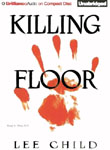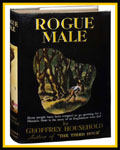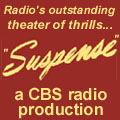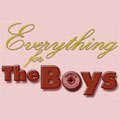
 Killing Floor
Killing Floor
By Lee Child; Read by Dick Hill
12 CDs – Approx. 14 Hours 48 Minutes [UNABRIDGED]
Publisher: Brilliance Audio
Published: 2004
ISBN: 9781423339854 (cd)
Themes: / Thriller / Murder / Mystery / Detective / Georgia / Conspiracy / Counterfeiting / Music /
All is not well in Margrave, Georgia. The sleepy, forgotten town hasn’t seen a crime in decades, but within the span of three days it witnesses events that leave everyone stunned. An unidentified man is found beaten and shot to death on a lonely country road. The police chief and his wife are butchered on a quiet Sunday morning. Then a bank executive disappears from his home, leaving his keys on the table and his wife frozen with fear. The easiest suspect is Jack Reacher – an outsider, a man just passing through. But Reacher is not just any drifter. He is a tough ex-military policeman, trained to think fast and act faster. He has lived with and hunted the worst: the hard men of the American military gone bad.
I’d heard about Lee Child for a while before I started reading his books. For a time there there was some confusion in my mind about who he was and what he wrote. I heard vague talk down the isles of bookstores. “Got any Child?” They’d say. “Lincoln?” They’d whisper. Or was it “Lee?” Then I’d hear about some character called “Repairman Jack” – or was it “Jack Reacher?” So with the confusion in the hearing it took a while longer than usual for the facts about who wrote what to float up from my unconscious to the part of my brain that thinks: “interesting.” The last time I heard about Lee Child was in Jolly Olde Books in Port Moody. That’s a used bookstore I frequent. The guy who runs the place reads Lee Child, and a couple of other booksellers I see in their from time to time were reading him too. They got to talking about how addictive the series was and that was the final clincher. When you run a used bookstore you really have your pick of books. They were reading Lee Child, so I thought I’d better get on the case too. Luckily Brilliance Audio has released most of this series, with at least one other done by Random House Audio.
But, even having the audiobook in hand, I had a hard time getting interested in listening to it. It sure doesn’t help to have such a generic title. And just look at it, the cover art is boooring. Apparently this is a very popular series, a bestselling series. That explains both the generic cover and the generic title. Killing Floor, the name sounds like just about every other techno-thriller/courtroom thriller/forensics thriller you’ll find in the supermarket paperback book rack; and that cover art only tells you vaguely about the genre – nothing about the story. The story starts out promisingly enough though. The story is told in first person, past tense (my preferred person and tense) by the protagonist, Jack Reacher. He tells us what is happening without much embroidery. When Reacher is arrested for murder, within the first few seconds of the novel, I was intrigued. It seemed like some sort of variation on David Morrell‘s First Blood: A stranger walks into small town USA and is arrested by corrupt cops. Fun. When the facts of Reacher’s backstory eventually drip out I still found myself fairly interested. Child’s explanation as to why Reacher is such a bad-ass actually makes pretty good sense too. What kind of police deal with the world’s most dangerous criminals? Child’s answer is: Military Police. The criminals the US Army deals with have been trained with every conceivable deadly art: firearms, hand to hand combat, artillery, grenades, demolitions – the many different ways of killing. A military policeman (MP) has to be trained better with these weapons than the criminals he confronts. And so an MP has to deal with the army’s best trained criminals: Green Berets, Rangers, Delta Force. Jack Reacher, we eventually find out retired from the army as a Major, having run his own criminal investigation unit (homicide investigation). A bit convienient but not too implausible. The mystery itself seems fairly interesting and Child wants to play fair. But there is one giant co-incidence that badly mars the narrative. It’s fairly well lampshaded by Reacher, but even in doing that I wasn’t wholly willing to forgive Child.
This novel has plenty of good characters and characterization. I can also see the seeds of themes that will probably reappearing in later books in the series. Like many novels of the last 25 years that I complain about Killing Floor is overly-long for the material it contains. The action sequences in the later chapters of the book are solid, but there were too many for the machinations of the plot. After listening all the way through I’d say this a solid novel with fairly good storytelling. I can see exactly what Lee Child is doing and am not particularly impressed. He’s gonna make a lot of money, but I can’t imagine anyone would ever bother to re-read one of these books. More likely they’ll just pick up another in the series and get more of the same kind of thing, just a bit different. It’s a slightly less obvious Mack Bolan story, a romance novel for men. So this is several steps removed from anything like spectacular.
Narrator Dick Hill has been a major audiobook narrator for longer than I’ve been an audiobook listener (that’s a long time). In Killing Floor he personifies Jack Reacher with a conspiratorial first person voice. When playing the other major players, criminals, love interests and fellow investigators he switches tone just enough to make it clear who’s speaking. I hope he reads more books in this series as if he does, and I get up enough interested to read another, I’d like him to narrate it.
Posted by Jesse Willis





 Everything For The Boys – Rogue Male
Everything For The Boys – Rogue Male
